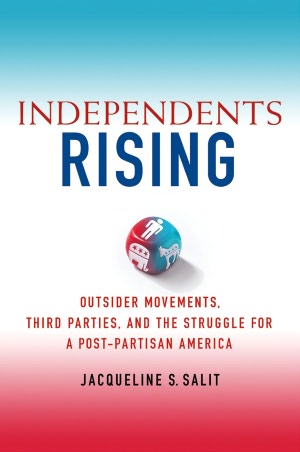Independents Rising, by Jacqueline Salit


A new book is now available for those interested in understanding the concept of the independent voter and the growing independent movement, its past, present, and future. Independents Rising, by Jacqueline Salit released by Palgrave Macmillan this week aims to clear up misunderstandings surrounding independent voters and establish the realities of their political power. She takes the reader through decades of major political developments of third parties and the growth of independents in America.
One of the major points explained in the book is the false idea that independents are centrist, or the growing number of non-affiliated voters are a centrist movement.
"Restoring a 'center' rests on the supposition that the existing institutions and power relations can and should be restored. Independents, in contrast, are searching for ways to develop the political system in accord with changing times," Salit writes. "Independents, organized without being a third party, are battling for structural reforms that loosen the grip of parties on government and politics."
Had independent voters not participated in Democratic primaries, Hillary Clinton would likely have been the nominee. In states they were permitted to participate, independents instead overwhelmingly supported Barack Obama and the idea he would lead as a post-partisan, writes Salit. When this did not pan out and independents began to view Democratic control in Congress negatively, it was those voters who helped elect Republicans in 2010.
Independents don't just lean, or cast their votes on a whim at the polls, necessarily. They want political reform beyond the current system.
Independents "are, by their choice, radicals--nonideological radicals, but radicals just the same," writes Salit.
The structural reforms Salit mentions are equally as important to understand. After the 2000 election, she says, momentum moved away from third parties to anti-party. She mentions a wave of term limit legislation largely a cause of rabid independent support. Open primaries in California, Washington and Louisiana have further close the gap between favoring the rights of political parties over the rights of individual voters.
Salit envisions a post-partisan system, not simply fixing the current one. Political parties, while completely absent from our Constitution, have become deeply entrenched into the American political landscape. They are subsidized by voters, despite being largely self-serving organizations.
Where Salit's book is most interesting is the anecdotes of independent successes and failures. A deeply entrenched member of two decades of independent movements, she gives insider accounts of campaign activities, deals and negotiations.
"The political power of independents rests in being outsiders, in not being attached to any party, major or minor," writes Salit. "This movement-in-the-making changes the political environment by changing the rules of the game."
Independents Rising is now available at Amazon, Barnes & Noble, and other major retailers.



